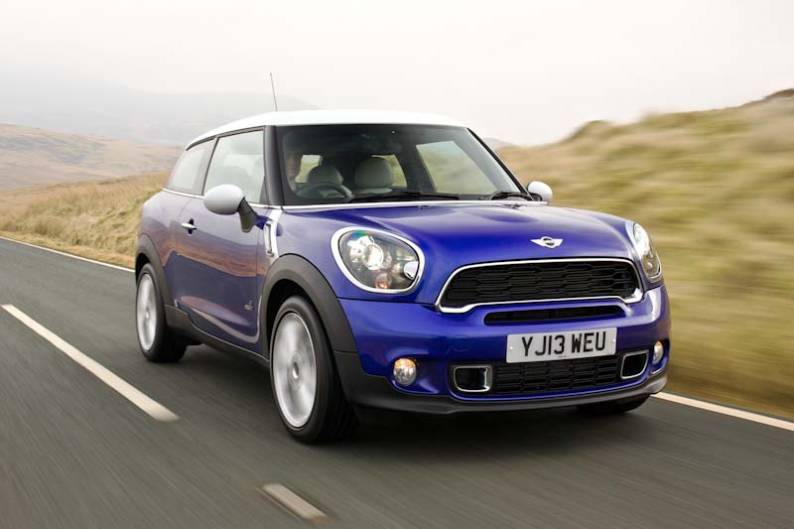
RAC sale – up to 33% off*
• Roadside cover from £5.29 a month†
• We get to most breakdowns in 60 mins or less
• Our patrols fix 4/5 breakdowns on the spot

By Jonathan Crouch
Introduction
The MINI Paceman. A niche too far? MINI reckoned not back in 2013 when it launched this slightly larger coupe-like three-door fashionably-orientated hatch. It was basically a coupe version of the five-door Countryman model, which means sportiness with a bit of extra space all packaged up very trendily indeed. But does it make sense as a used buy?
Models
3dr Hatch (1.6,2.0 petrol /1.6,2.0 diesel)
History
Owning a MINI has always been fun but it's rarely been very practical. Lovely to have the go kart handling and dinky little shape of course, but over the years, many have quickly tired of the cramped cabin and rock hard ride. The only way the brand could keep these people would be to bring them a sporty MINI that was also comfortable and spacious. So in 2013, the company launched this car - the MINI Paceman.
It was the eighth member of the MINI family and probably the hardest to pigeonhole. But that all depends on how you look at it. Let us simplify it like this. Back in 2013, there were essentially two kinds of MINI: the British-built Hatch, Clubman, Convertible, Coupe, Roadster and Clubvan models, all derived from essentially the same platform. And then there was a rather different, much larger five-door design with styling cues to give it a MINI look, built for the brand by Magna Steyr in Austria: the Countryman SUV. Take that car's greater comfort and practicality, then blend it with a coupe body style and a bit of traditional MINI fun and you'd satisfy quite a few potential buyers. That at least was the thinking behind the Pacemen.
At the time, we thought it was an approach that made a lot of sense - but we were in a minority amongst those who tried to review this car, most of whom struggled to see the point of the whole thing and the reason why MINI would take a five-door Crossover SUV and try and make a fashionable little coupe out of it. We actually never thought the concept was very difficult to grasp: as we said, what we have here is a MINI that can be both sporty and properly spacious - a car the marketers have branded as a 'Sports Activity Coupe'. It sold in modest numbers until being quietly deleted from the range in 2016.
What You Get
From launch, everyone seemed to have an opinion about this car and we suppose for any fashionable little trinket, that's a good start. Dismissing it as merely a three-door version of the chunky MK1 MINI Countryman is a bit cruel. The brand was, after all, is at pains to point out that though the two cars are identical up to the A-pillar, behind that this Paceman has a 39mm reduction in roof height and a 10mm reduction in ride height to give a sportier, more purposeful demeanour. It certainly looks less wilfully odd than the smaller MINI Coupe that sold in the same era.
Walk around the car and you can see the effort that's been put in to trying to give this design its own personality. So as well as the familiar floating roof and blacked-out window surrounds, there are bulging wheel arches, little MINI logos in the indicator lenses and a rising waistline that converges neatly with the sloping roof at the rear of the car into quite a unique rear hatch.
It's inside though, where things get a little more interesting - particularly at the back, an area easily accessible through the wide doors. The highlight is the unusual rear seat, which has been styled around a 'lounge concept'. That might be over-stating things it a bit but you do get two - and only two - individual chairs with armrests integrated into the rear trim. You couldn't exactly say that there's room to stretch out here but the couple of adults who'd never fit in the back of a MINI Hatch (and can't be accommodated at all in a MINI Coupe) should be fine on shorter journeys. One six footer can sit behind a front seat occupant of similar size without undue discomfort and it also helps that the front sports seats are mounted a little higher than they are in the Countryman, so you can more easily slot your feet underneath them. Despite the lowered roof height, headroom is actually quite adequate and to keep passengers interested in their surroundings, a two-section version of the MINI Centre Rail storage and attachment system - first seen in the Countryman - came as standard. A longer full-length version was optional.
Up-front, apart from a few minor details (redesigned air vent surrounds and different instrument binnacle trim), it's pretty much exactly as per that Countryman model, which is either welcome or a bit disappointing, depending upon your point of view. It's certainly not very coupe-like: you sit high up and stretch down to operate the gear lever, just as you would in an SUV. As usual, you get a centrally mounted speedo the size of a dinner plate and big enough to also house the audio, the fuel gauge and the optional sat nav. Another classic MINI touch is the stand-alone rev counter tucked in its own binnacle directly behind the steering wheel and including read-outs for the fuel economy and the odometer, though it's necessary to slightly crane your neck over the centre steering wheel boss to read them.
As for boot space, well the fact that this Paceman has the same wheelbase as a five-door MK1 MINI Countryman and is pretty much exactly the same size really pays dividends here. Access is via a large and high-opening tailgate and once you raise it to reveal a usefully low boot lip, you'll find that luggage capacity is simply in another league from conventional MINI models, despite the way that the tail lights protrude into the load area. The MINI Coupe can offer only 280-litres - and that's only because it has no rear seats. The MINI Hatch from this era has only 160-litres. In contrast, this Paceman's cargo area is 330-litres large and can be further extended to 1,080-litres by pushing forward split-folding rear seats that don't fold quite flat. There's also a useful under-floor compartment to keep valuables away from prying eyes.
What You Pay
Please fill in the form here for an exact up-to-date information.
What to Look For
There aren't many reported issues with this Pacemen mechanically. We came across a few cars experiencing the odd clutch problem. The torque of the engine seems to be part of the problem, but some owners have reported that their clutch was slipping quite early in the car's life. Even then, it wasn't that straightforward. Apparently, the on-board sensor designed to be an early-warning system of clutch failure proved in some cases to be just too sensitive for its own good, throwing up false warnings on the dashboard when there was actually no problem at all. Dealerships have tackled this by taking any car in question out on to the road and performing a series of full-throttle acceleration tests in both second and fourth gear. Any clutch slip meant a new clutch was needed, but if there was no slip, the software was recalibrated to prevent the false alarms. Either way, the acceleration test is one you should perform, particularly when test-driving any Cooper S or JCW variant with a manual gearbox.
The other thing to watch is for a car that has had skipped oil changes. Check the service handbook for any missed scheduled services and ensure the oil on the dipstick is relatively clean. The problem with skipped oil changes is most likely to show up in the variable valve-timing system these engines use, and dirty oil will foul the small oilways and filters quick smart. At which point, it's a pricey, expensive fix. Other key checks include the condition of the brake pads and discs, as well as the battery's age and ability to hold a charge.
Replacement Parts
(approx based on a 2015 MINI Paceman Cooper S excl. VAT) Front brake pads start at around £37, though you can pay up to around £66 for pricier brands. Rear brake pads start at around £27, though you can pay around £56 for pricier brands. Front brake discs start in the £92 bracket - it's around £40-£93 for rears. Oil filters cost around £4-£10. Air filters sit in the £6-£20 bracket. A wiper blade costs between £10 and £17. And a radiator is about £232-£242.
On the Road
As the engine burbles into life and you get ready to put the Paceman to the test, you can't help wondering what on earth the whole experience is going to be like. The bespoilered three-door bodyshape leads you to expect a hot hatch driving experience but behind the grippy little leather-trimmed wheel, you're sat high up like you would be in an SUV. This is a high-riding chunky car. It's never going to handle like a much smaller, lighter, lower-set conventional MINI Hatch or Coupe, so come rather unrealistically expecting that and you're going to go away disappointed. There's far more body roll than MINI regulars will be used to and the car is less ready to change direction at your slightest whim. It's quite hard to get all of the traction down through tighter bends too, even if you're at the wheel of a model equipped with a DTC traction control and an EDLC Electronic Differential Lock Control package supposed to help you do exactly that.
Well aware of all this, the Paceman development engineers tried to improve things and return something of the brand's trademark gokart-style responses by giving the electric power steering a direct, hyperactive feel and by specifying firm Sports suspension as a standard fitment across the range. We can see a lot of potential owners wishing they hadn't bothered. Those rock hard springs leave the damping on the firm side of firm and as for the steering, well, the car darts left and right with the smallest movement of the wheel, which takes a bit of getting used to if you're new to the whole MINI experience.
Both issues are correctable though. Original buyers could specify a standard and much more comfortable suspension set-up as a no-cost option. And the steering, we've found, improves noticeably when you weight it up by pressing the provided Sport button, an action which also sharpens the throttle response and will quicken the gear change if you've got a 6-speed Steptronic automatic model. It also offers up a fruitier exhaust note with lots of lovely pops and crackles on the over-run. So you can convince yourself quite easily that you're having fun, even if the rather vague driving dynamics suggest otherwise.
Under the bonnet, Paceman customers choose between the same 1.6-litre petrol and diesel engines that all MINI models from this era had to have, though they do enjoy a slightly wider selection than those on offer with the MINI Coupe sold in this period. Specifically, that means an extra lower-powered 112bhp diesel option at the foot of the range if you can't stretch to the 143bhp Paceman SD diesel that probably offers the best balance between power and parsimony. SD buyers see the 0-62mph rest to 62mph sprint time improve from 10.8s to 9.2s, while the top speed rises from 116 to 124mph.
Petrol people meanwhile get a Paceman Cooper model with a 1.6-litre 122bhp unit offering a sprint to 62mph of 10.4 seconds, while the Paceman Cooper S uses the same engine, tuned to deliver 184bhp. If you're quick with the slick, incisive 6-speed manual gearstick, it'll get to 62mph in 7.5 seconds en route to 135mph but if that's not fast enough, the flagship John Cooper Works Paceman uses a 218bhp version of this unit allied to ALL 4 all-wheel-drive, taking this variant to 62mph in just 6.9s on the way to 140mph. The ALL4 set-up was optional from new elsewhere across the line-up, something unavailable to MINI Hatch or Coupe customers from this era. Another reason for preferring a Paceman.
Overall
One journalist we read of described this Paceman as 'the perfect car for someone else' - and we kind of understand what he means. It wouldn't necessarily suit us, but we know a lot of other people who'd simply love it. MINI calls this a 'Sports Activity Vehicle', whatever that means: we'd simply call it a 'cute-ute', a crossover with a bit of sporting attitude. A larger MINI that can also let its hair down a bit.
According to its marketeers, this isn't a car defined by age or gender - which is probably right. It's as likely to be driven by an upwardly mobile thirty-something man as it is by a retiree or a lady who lunches. Yet another reason why this car is so difficult to pigeonhole. But then, that's probably part of its charm.
What we do know is that this Paceman, the MINI Countryman's younger, sportier coupe cousin, offers something refreshingly different, part Crossover, part hot hatch. And it's perfectly pitched to satisfy those who want a sporty MINI with extra space and style. Just as it was intended to.







